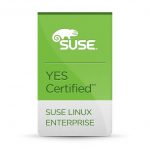Even in a commodity hardware world certification is crucial
Is hardware certification important in the world of evolving “commodity” servers and desktops?
Should you care if your SUSE® Linux Enterprise Server or SUSE Linux Enterprise Desktop installation is on SUSE YES Certified hardware?
The correct answers are YES and definitely YES!
Long History of Hardware Cert
The YES Certification program has been validating hardware platforms for more than 20 years, providing IT professionals (and their management) a high-level of confidence that there will be compatibility between their hardware and SUSE Linux Enterprise. Today, YES Certification still provides and requires actual functional compatibility tests between the hardware system and SUSE Linux Enterprise (OS) to validate compatibility. All hardware partners who YES Certify must pass the same stringent testing requirements for them to say that their system (server, desktop, laptop, etc.) is “SUSE YES tested and approved.”
Today, hardware has become a component-level commodity in which system boards often use the same components, and then many of the brand-name companies use them as their main system board for their servers and desktops. Even with that trend certification is essential.
Here’s why.
When a hardware platform is YES certified, the hardware and that version of SUSE Linux Enterprise are validated for compatibility in key areas where the hardware and OS interact or “touch” one another. System firmware and the boot process are two hardware areas or components that certification validates. Future blog entries will cover additional information and components included in YES Certification.
Compatibility at OS Boot
The BIOS/system firmware or UEFI firmware begin the interaction with the OS boot loader before the OS even begins to boot. Without testing this can and does fail on some systems. The OS installation begins the process of interaction between the host bus adapter, the storage disks (two hardware components) and the storage drivers (software or kernel modules). For the most part, the storage drivers used in modern hardware are included in the SUSE kernel but must be validated in the specific hardware system to ensure full functionality. Certification performs this compatibility validation. Other firmware components that interact with the OS include ACPI, p-state/c-state, processor features, virtualization, devices and I/O ports and boot options, just to name a few.
SUSE YES Certification is an essential component to look for when making hardware  decisions. You can find more information about SUSE YES Certification at: https://www.suse.com/partners/ihv/yes/ or search for certified hardware at https://www.suse.com/yessearch/. How you can use certification to help you make better hardware decisions, justify your suggestions to your management and, hopefully, sleep better at night with less stress. Stay tuned for more blog entries.
decisions. You can find more information about SUSE YES Certification at: https://www.suse.com/partners/ihv/yes/ or search for certified hardware at https://www.suse.com/yessearch/. How you can use certification to help you make better hardware decisions, justify your suggestions to your management and, hopefully, sleep better at night with less stress. Stay tuned for more blog entries.
Related Articles
Mar 17th, 2023
SUSE Linux Enterprise Micro 5.4 Public RC is out!
Feb 15th, 2023
Ransomware Attacks – Part 3, Container Security
Jun 22nd, 2023
Comments
Well said, Drew. In the computer arena where the only constant is change, certification is as relevant and important as it was 20 years ago. And it will be equally important 20 years from now.
very well written,Drew. This clearly explains the “need” for certifying the hardware’s and OS. The YES! certification gives the assurance and the confidence that the hardware is compatible with SUSE Enterprise software.